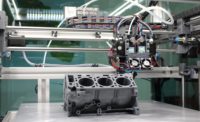Quality Headline
New ASTM International Group Will Help Expand Applications of Additive Manufacturing Technologies

ASTM International’s committee on additive manufacturing technologies (F42) has launched a new subcommittee focused on creating standards that support the growing number of applications of the technology across various industry sectors.
“The evolution of additive manufacturing technologies combined with sector-specific requirements demand us to create a broader portfolio of more detailed and stringent standards that support qualification of high value-added parts and components. The new subcommittee will help broaden F42’s scope, helping meet these industries’ specific emerging needs and fill their technical gaps” says Mohsen Seifi, Ph.D., director of global additive manufacturing programs, ASTM.
ASTM International member Shane Collins will chair the new applications subcommittee (F42.07). Collins says, “The point of the new subcommittee is to support specific industries where we need more and robust test methods, materials, processes, environment, health, and safety standards to ad-dress the many directions in which additive manufacturing is being used today.”
According to Collins, “We are reaching the tipping point in many industries. More and more parts are manufactured efficiently using additive manufacturing instead of traditional manufacturing. By creating industry-specific standards, we can continue to support that innovation.”
The new subcommittee intends to launch efforts in: aviation; construction; consumer; electronics; maritime; medical and biological; oil and gas; spaceflight; and, transportation and heavy machinery.
“ASTM International continues to expand its decade-long footprint in additive manufacturing,” says Pat Picariello, the committee’s manager. “This subcommittee will play a key role in keeping the committee on the cutting edge of standardization development, maintaining its responsiveness to a constantly-evolving set of needs.”
This new subcommittee launches in the same year as ASTM International’s Additive Manufacturing Center of Excellence, a global partnership aimed at supporting research and development activities that support standardization and related areas.
For more information, visit www.amcoe.org.
Looking for a reprint of this article?
From high-res PDFs to custom plaques, order your copy today!






